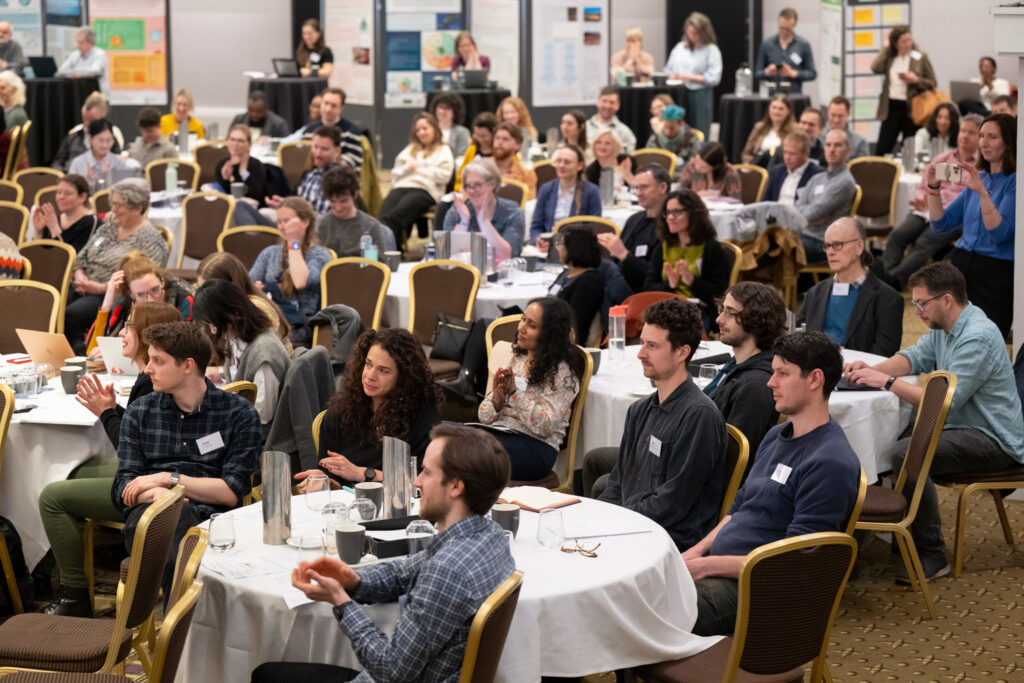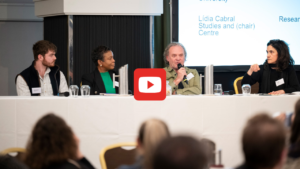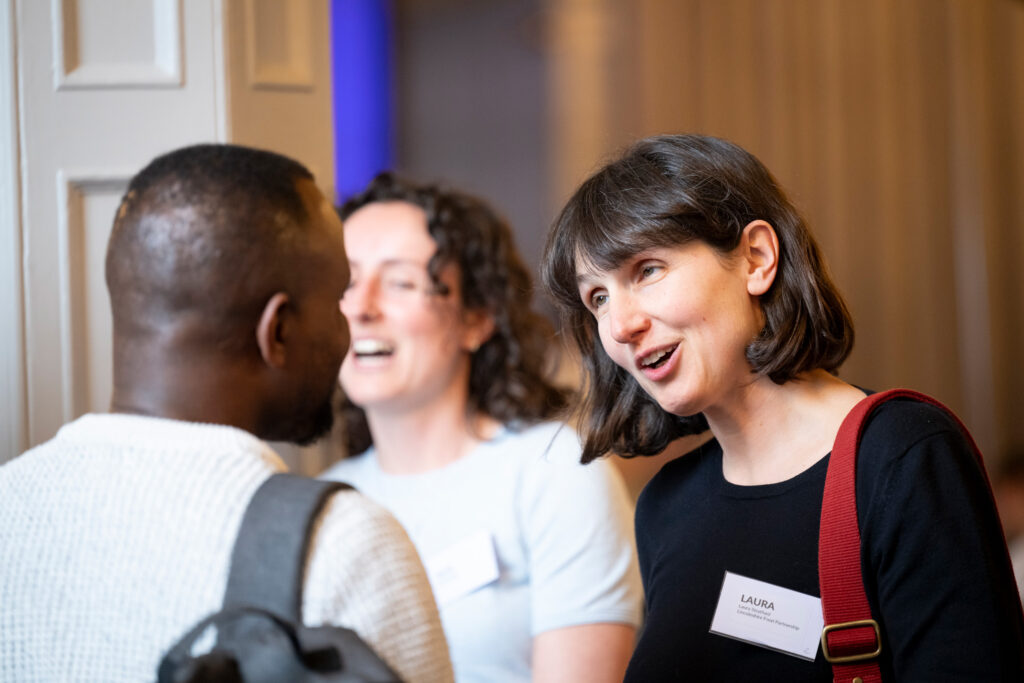Event information
Big Tent 2025
Event details
The ‘Big Tent’ is the annual meeting of the Network and an opportunity for participants to hear from, and engage with, researchers, business leaders, policy-makers and voluntary organisations working for change in the agri-food system to meet the UK’s net zero 2050 goal. The programme was designed around inclusivity and involvement, maximising the opportunities for networking between participants, with a mix of keynote talks, panel sessions and breakout discussions. The event also gave delegates the chance to engage and contribute to the AFN Network’s Roadmap, a set of proposed pathways being developed for how UK agri-food could be transformed for a net zero UK. The work builds on the future scenarios developed in 2023.
Agenda
DAY ONE: Tuesday 11 March 2025
10:00 Arrivals and registration
10:30 Introduction and welcome
10:45 Keynote speech: Professor Bob Doherty, University of York, ‘Working across the Science-Policy Boundary’
11:30 Plenary: Introducing the AFN Roadmap
12:15 Plenary: Engaging with the AFN Roadmap
13:00 Lunch; Networking session
14:00 AFN Project Spotlights
14:30 Break out: Engaging the AFN Roadmap: Scenarios, Interventions and Trade-Offs
15:30 Tea and coffee break
16:00 AFN Project Spotlights
16:30 Just Transition Panel & Discussion: How to ensure a just transition while achieving net zero?
17:30 Drinks Reception and Poster Session
19:00 Dinner
DAY TWO: Wednesday 12th March
09:00 Arrivals and registration
09:15 Panel discussion: Can UK land solve net zero, self-sufficiency and public health?
10:15 Keynote speech & Q&A – Riaz Bhunnoo, Director of the Global Food Security Programme at UKRI
10:45 Coffee break and Unconference voting
11:00 Coffee break
11:15 Panel discussion: How has the AFN made a difference to you?
11:45 Roadmap – Revisit and discussion
12:15 Keynote speech & Q&A – Emma Pinchbeck The Climate Change Committee and Seventh Carbon Budget
13:00 Lunch
14:00 Unconference
16:00 Event close
Keynote speakers

Emma Pinchbeck
Emma Pinchbeck is the Chief Executive of the Climate Change Committee, the UK’s national climate advisor. The body advises on the country’s Carbon Budgets and Climate Change Risk Assessments and does annual assessments of the Government’s progress.

Bob Doherty
Professor Bob Doherty is the founding Dean of the School for Business and Society at the University of York (UoY). Bob is also Principal Investigator of the £6.2m five-year research programme (2021-2026) FixOurFood. This interdisciplinary programme works with schools, businesses, farmers and policy makers to create transformative food system change. Bob was seconded in April 2019 for three years into DEFRA as a senior policy fellow to work on Food Systems policy development.

Riaz Bhunnoo
Riaz provides strategic leadership to UKRI’s Global Food Security (UKRI-GFS) programme and drives forward cross-stakeholder, interdisciplinary activities. Alongside UKRI food, Riaz currently oversees BBSRC’s thematic research challenges. He was trained as an organic chemist and has spent time working in RCUK and at the Gates Foundation.
Panel discussion: Can UK land solve net zero, self-sufficiency and public health?

Emily Norton (Chair)
Emily Norton has 25 years’ experience in the food and farming sector. She originally qualified as a lawyer before undertaking an MSc in Sustainable Agriculture. Her career has taken her from family business to global PLC, with time spent in Brussels and across the UK. Emily is the founder of Farm Foresight Ltd, a strategic advisory service for the land management sector, working with farmers, investors, politicians and businesses on rural policy and emerging trends.

Ali Morpeth
Ali Morpeth is a Registered Public Health Nutritionist (RNutr) working at the intersection of health and sustainability. For the last 15 years, she has worked on policy change that delivers win-win for people and planet. Ali is passionate about the opportunities that arise from drawing the dots between health and sustainability, and believes we can address the failings of the food system faster and smarter by working across these disciplines. She recognises that what we eat, and the way food is produced, is driving interrelated crises – to public health, climate and nature.

Kate Bannister
Kate Bannister is Net Zero Project Delivery Manager for the NFU. The Net Zero Project Delivery Manager role provides the focus to translate the net zero by 2040 ambition into action on the ground. The approach has three strands: policy development and support, bringing together cross sector expertise both internally and developing external stakeholder relationships, and to work with membership to communicate the ambition. Kate’s background is in communications and engagement with a strong emphasis on relationship and project management, having worked agency-side for many years.

Lee-Ann Sutherland
Professor Lee-Ann Sutherland is Director of the James Hutton Institute’s International Land Use Study Centre and co-lead of the UKRI’s Land Use for Net Zero Hub. Raised on a family farm in Canada, Prof Sutherland is an agricultural sociologist who has worked extensively across Europe and the UK. Her current role focuses on mobilising a broad range of disciplines to effectively inform policy development. She is particularly passionate about social justice issues in agriculture (gender, new entrants, ethnicity) and support for agricultural knowledge and innovation systems.
Panel discussion: How has the AFN made a difference to you?

Dominic Watters
Dominic Watters speaks from a forgotten part of a council estate in Kent. Raising his amazing daughter as a single dad helped him articulate the realities of living in poverty to influence national forums on fuel and food insecurity. Now widely regarded as a voice of the poor, Dominic has found a new home as a research fellow with the School of Geography at the University of Southampton. He is currently working on projects to develop relationships with policymakers and food producers to reimagine and tackle the food insecurity experienced in his estate, and the world.
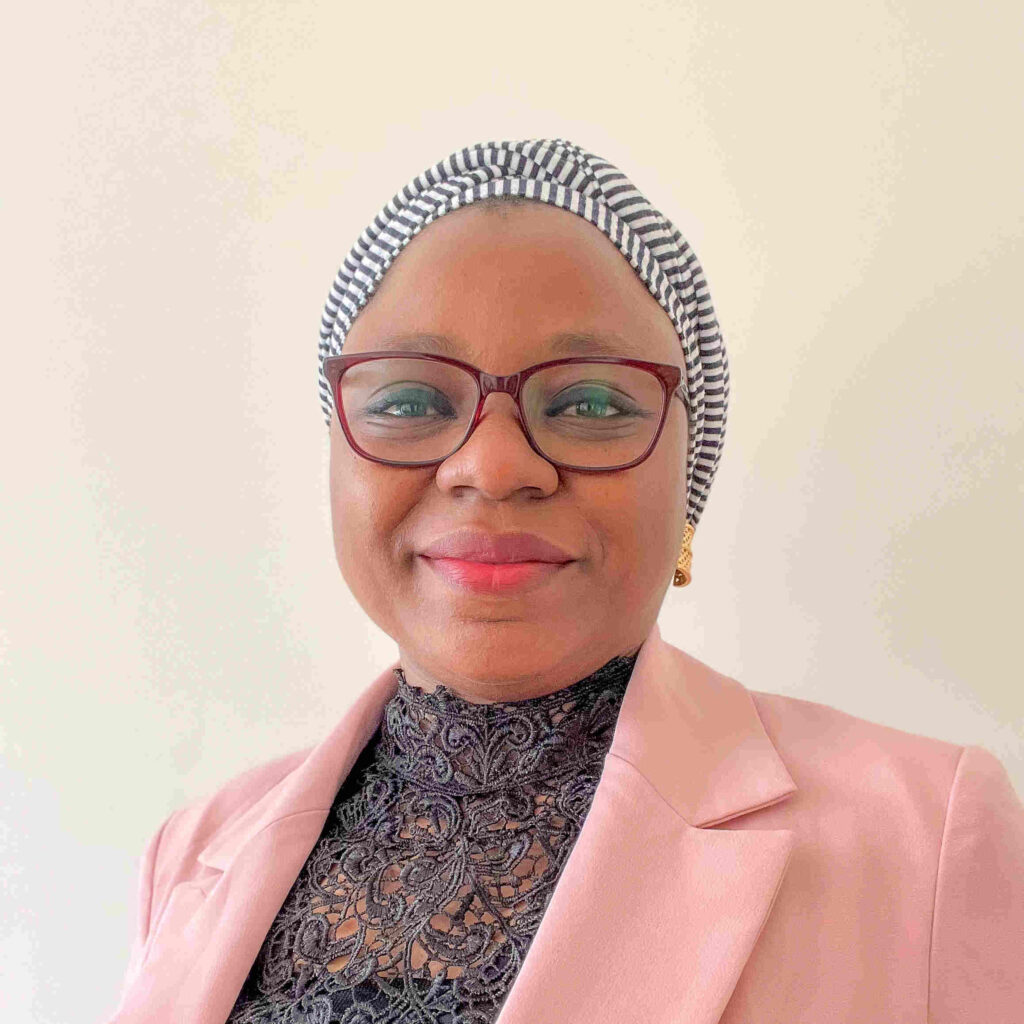
Zainab Oyetunde-Usman
Zainab is our current Year 3 Champion in Carbon Financing. She is a Research Social Scientist at Rothamsted Research Net Zero and Resilient Farming Department. She is a trained agricultural economist with experience in applying behavioural approaches to designing and fostering mechanisms to incentivise adoption of net zero innovations. She is involved in interdisciplinary research engagement co-developing pathways to achieving net-zero with stakeholders across the UK agri-food systems. Zainab has over time engaged with the AFN Network+ as an ECR member and a scoping study project lead.

Saher Hasnain
Saher is a Researcher at the Food Systems Transformation Programme with the University of Oxford’s Environmental Change Institute and an Environmental Change Research Fellow with Reuben College. Trained as an environmental scientist and geographer, she specialises in food systems transformation and resilience, food geography, and urban environmental health. At the Environmental Change Institute, she works on an interdisciplinary portfolio of projects focused on food systems and foresight analysis.

India Langley
India is a seasoned agri-food professional with a decade-long commitment to improving agri-food sustainability. Throughout her career, she has been dedicated to fostering positive change through grassroots initiatives and innovative projects. India’s expertise spans a diverse spectrum of organisations, including research groups, start-ups, and nonprofit entities. Many of the projects she’s worked on have garnered widespread recognition, notably capturing the attention of prestigious platforms including: two COP world summits (26 & 28), the UN Food Systems Summit Dialogues, and the Royal Society. Furthermore, these projects received significant press attention underscoring their relevance and impact.
Panel discussion: How to ensure a just transition while achieving net zero?

Lídia Cabral (Chair)
Lídia is a Research Fellow at the Institute of Development Studies, in a role that involves teaching, research, and policy advisory work. As part of her work, Lídia interacts with researchers, civil society organisations and international and national governmental agencies mainly in Brazil, Mozambique and the UK. Lídia trained as a social scientist and her current research interests focus on the interface between justice, equity and sustainability in food systems. She is presently researching how rewilding in the UK can integrate food justice with nature recovery goals. She is also partnering with action-research networks in Brazil and the UK to strengthen territorial food equity. Lídia co-convenes the MA Food & Development programme at IDS/University of Sussex, is a founding member of the Food Equity Centre and volunteers with a local affordable food project in Brighton & Hove.
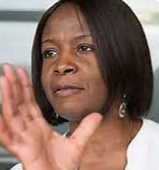
Denise Bentley
In 2010, Denise and her husband Aerold established First Love Foundation with the mission of tackling social injustice and addressing the root causes of poverty and deprivation. Their first project, the Tower Hamlets Foodbank, was launched to meet immediate needs. However, driven by a desire to create lasting change, they went on to develop the Advice & Support Project. Through this initiative, they have seen its transformational impact on people’s lives. Today, First Love Foundation is a specialist legal advice service offering comprehensive wraparound support. Denise is a passionate advocate, an accomplished speaker, and has appeared in numerous media outlets. She is also regarded as a respected governmental advisor.

Ben Messer
Ben Messer is the Participation and Engagement Lead at Food Matters, a UK-wide charity with a focus on people-centred food system change, and programme partner in the Sustainable Food Places programme, where Ben leads work on engagement, participation, representation and justice. He is an expert facilitator of participatory processes with over 30 years’ experience in the UK and the Developing World, supporting communities and organisations to work together collaboratively and fairly. Since 2020 he has led SFP’s work on developing the REDI for Change ethos, embedding active anti-racism in the SFP Programme and UK-wide Network of 114 food partnerships. This includes co-design of the REDI Review Tool, a participatory process helping food organisations reflect on their culture, practice, and people through the lens of Race, Equity, Diversity and Inclusion.

Ben Edwards
Ben Edwards works within the dairy sector and is researching his strong interest in agricultural policy, environmental land management, and conservation. Currently completing a dissertation on the impact of post-Brexit policies on English farmers, Ben has explored how schemes like ELMS affect farm sustainability and profitability. With hands-on experience in the industry, Ben is passionate about ensuring that policy decisions reflect the realities faced by farmers while balancing food production with environmental conservation. Later this year, Ben will be heading to New Zealand to continue working in the dairy sector and further explore sustainable farming practices.




